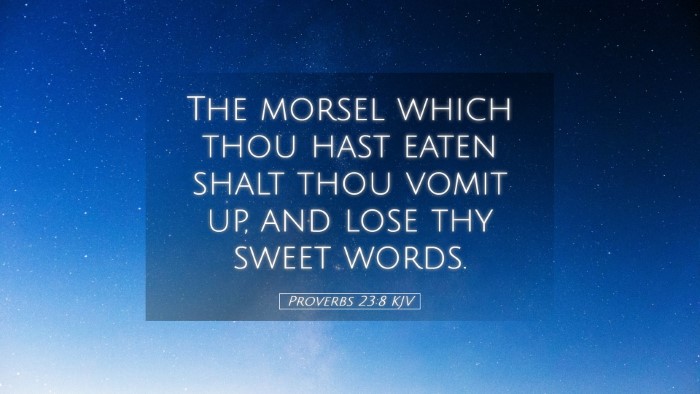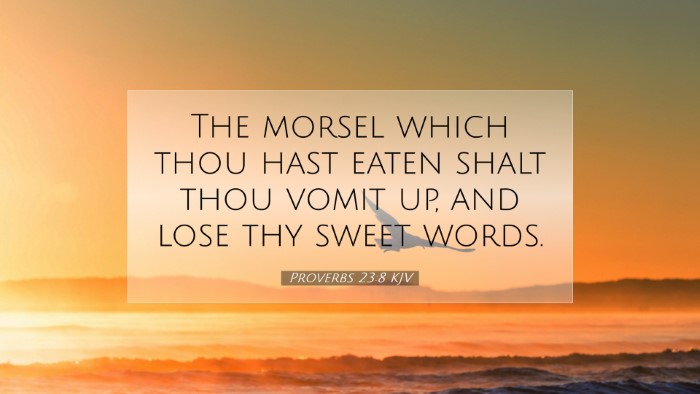Commentary on Proverbs 23:8
Verse: “The morsel which thou hast eaten shalt thou vomit up, and lose thy sweet words.” (Proverbs 23:8, KJV)
Contextual Overview
This verse is situated within a larger discourse on the behavior and consequence associated with indulgence, especially in the context of dining with the wealthy and untrustworthy. The preceding verses offer wisdom about the perils of associating with those who are greedy and the vanity of pursuing treasures that corrupt the soul.
Insights from Public Domain Commentaries
Matthew Henry's Commentary
Henry emphasizes the futility of seeking gratification from indulgent meals prepared by the wealthy, suggesting that such pursuits lead to spiritual emptiness. He outlines that the act of consuming the ‘morsel’ is not merely physical but signifies a deeper engagement with the corrupting influences of those around us.
- Physical vs. Spiritual Nourishment: Henry points out that ingesting these 'morsels' often results in a spiritual purging. The 'sweet words', which symbolize flattery or the empty promises of the wicked, will eventually lead to disappointment.
Albert Barnes' Notes on the Bible
Barnes elaborates on the metaphorical implications of the verse, noting that it serves as a warning to those who might compromise their values for temporary gains. He asserts that the indulgence may initially seem pleasurable but will culminate in regret.
- The Consequence of Indulgence: Barnes highlights how the enjoyment derived from such indulgence will turn bitter, reflecting upon the greater loss of integrity and virtue that accompanies the momentary pleasure.
- Loss of Sweet Words: The 'sweet words' represent both the pleasing words of falsehood spoken to persuade us and the commendations we might receive for associating with the wicked. In the end, such associations lead to loss—both spiritually and morally.
Adam Clarke's Commentary
Clarke interprets this proverb through a psychological lens, suggesting that what one gains through greed and gluttony will ultimately be repaid with shame. He stresses that the consumption of such indulgences is temporary.
- Reflective of Life Choices: Clarke believes this serves as a caution against living for immediate pleasure, which results in long-term spiritual emptiness and regret.
- Illusions of Satisfaction: The metaphor of vomiting up what is eaten resonates with Clarke's view that what one consumes without wisdom—be it food or words—will eventually need to be expelled, leaving one with nothing but regret and dissatisfaction.
Practical Applications
This verse offers profound insights for pastors, students, and theologians. It encourages them to consider the moral and ethical implications of their associations and choices. The metaphor of 'vomiting up' what was previously consumed serves as a vivid reminder to reflect on what truly nourishes our souls versus what results in spiritual decay.
For Pastors
Pastors should utilize this text to guide their congregations in discussions about the importance of maintaining integrity in relationships and the dangers of pursuing wealth through dubious means.
For Students and Theologians
Students of the Bible are urged to dig deeper into the cultural and historical context of wealth and famine, understanding that wisdom literature like Proverbs offers timeless truths applicable in any socio-economic structure.
For Bible Scholars
Bible scholars can explore the literary devices present in Proverbs, examining the use of metaphors and the ethical implications of wisdom literature. Furthermore, the correlation of this verse with similar themes found in other biblical texts regarding wealth and folly can yield rich theological discussions.
Conclusion
Proverbs 23:8 serves as a powerful reminder of the transient nature of worldly pleasures and the necessity of weighing our choices against the eternal values of wisdom and integrity. As believers strive to make decisions that honor God, this verse provides a clear biblical perspective on the hazards of indulgence, urging a return to wisdom and discernment in all areas of life.


